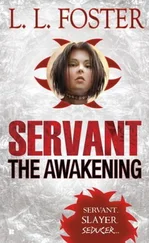The gray sky and brisk wind added a nasty chill to the air, but Gaby paid no heed as she concentrated on the side streets and main intersections, learning the area and committing it to memory.
After several miles of walking, she found a bus stop and joined others huddling under a lighted metal enclosure that would protect them from the rain.
Recognizing the difference between the squalor of the areas she usually frequented and Luther’s middle-class comfort, Gaby stuffed her knotted hands into her sweatshirt pockets.
Truth be told, she felt more comfortable near the dregs of society, in the projects and government housing units. There, surrounded by crime and immorality, around people driven by indifference and desperation, she felt at home.
Mort, her old landlord and now a friend, had kept his building clean and semi-secure, especially since the comic book store he owned was attached to the living quarters. But at night, she could hear the drunken arguments, the domestic abuse, the drive-by shootings and gang disruptions.
And it . . . comforted her.
There had been a bus stop not two blocks from Mort’s front door, but not even a bench remained at the designated location. Miscreants of the serious and not-so-serious kind had repeatedly demolished it, as much out of boredom as a display of street cred. No one had bothered to replace the seat or the shelter.
Though she hated to be fanciful, Gaby missed the old place. At least while staying there, she’d understood her life and her purpose.
Then she’d met Luther, and he’d turned her whole existence upside down. Running from him had seemed the safest bet. For a time, she’d stayed with hookers and put up with Jimbo, their pimp.
She’d changed her look, changed her location, changed almost everything about herself except her duty—and still Luther had found her.
Bliss claimed they were destined to be together.
So dumb. How could that possibly be?
Gaby hunched her shoulders, driven inward by her thoughts.
She did believe in Bliss’s intuition, but Bliss was little more than a child, as much an outcast as Gaby herself. Until Gaby stepped in, she’d been a hooker.
Now she was a friend.
Damn, how many freakin’ friends did she need, anyway? She was starting to collect them the same way a mangy dog collected fleas. She’d gotten by for a long time all on her own. Other than Father Mullond, the priest who’d helped her understand her calling, she’d had no one.
And she’d been fine and dandy all alone. It was better. For her, for everyone else.
But things had changed irrevocably.
An older woman gave Gaby a sympathetic smile, and she realized how darkly she scowled.
Shit. She turned away from the granny and turned up her music until it made her eardrums vibrate.
Disgruntled by the rapid changes taking place in her life, Gaby kept her distance from the warmly clothed men and stylishly dressed women at the stop. Leaning on a brick structure, she surveyed the traffic, both human and automotive.
People laughed or talked, some with umbrellas open, some with collars up. A few had devices in their ears and appeared to be in deep conversation with . . . no one.
Even those waiting for the bus were in a hurry to get somewhere, likely nowhere important. That mind-set, the on-the-go lifestyle, made no sense to Gaby.
These people acted safe, as if anyone ever truly could be. They had no awareness of the ugly societal deformities that loomed around them. Homicidal psychopaths lurked everywhere, disguised as neighbors, family, friends, or lovers. Fiends of every disorder existed hand in hand with innocents.
Yet none of these people had a clue.
And Gaby could never forget. Not for a second. God, she was out of place here, and sooner or later Luther would realize it.
The bus finally came and Gaby waited until everyone else had boarded before taking a seat toward the back. No one sat by her, but several people stared.
Was she that transparent? Did even strangers recognize her deviant presence among them?
Their auras filled the bus with a churning hue of expectation, urgency, boredom, and complacency. Not one of them understood the day-to-day peril they faced.
Choosing to ignore them, she turned to stare out the foggy window. Like veins on emaciated flesh, raindrops traveled haphazardly over the dirty glass, occasionally crisscrossing and blending, only to branch out again.
Gaby contented herself by watching as tidy buildings gave way to shops with crumbling bricks and peeling paint. One by one, the social scale of the bus’s occupants changed. The “nice” people got off, and a new element boarded.
The hypnotic hiss of bus tires on wet pavement, the gray day and drizzling rain, softened the reality of bars and tattoo parlors that replaced groceries and salons.
Falling into a lull, Gaby lost herself in her raucous music—until her unfocused gaze snagged on one particular tattoo parlor. Beautiful swirling colors and font shapes drew her attention to an ornate sign indicating the artwork available inside.
But around that sign, encompassing the façade of the tidy, well-kept building, a thick, dark impression of reality swirled. This aura wasn’t so much a glow as a smoky film in dirty colors of sulfur and mustard, rich with pain and anger.
Gaby pressed a hand to the window and stared. Black boreholes pierced the shades, and through those holes, small white explosions, spurred by artificial stimulation, told Gaby that the tattoo parlor partook of some serious drug use. Shades of grave imbalance indicated a lack of sanity. A crazed sociopath lurked inside.
Gaby’s senses kicked.
This wasn’t a true alarm, but more like sensory awareness of things being out of place. It thrilled her to have found a firm purpose.
Adrenaline rushed through her lax limbs as Gaby stood to make her way to the front of the bus. The second the driver stopped, she got off, removed her earphones, and surveyed her surroundings.
Even the air smelled different here, not as green, crisp, or clean as it did near Luther’s home. Here, she smelled the smoke of factories, the odor of rotting garbage, and the sticky stench of unwashed bodies.
This was her world.
She knew what to do here.
Renewed by familiarity, Gaby started back up the street toward the tattoo parlor, but before she’d gone more than a few steps, the vicious snarling of dogs drew her gaze.
Across the street, three young men with two pit bulls on leashes approached the gated area of an old elementary school. The school’s windows were all shattered or boarded up, but in the yard a ramshackle playground inhabited by an old moldy sofa and a few treadless tires remained.
The men were muscular guys, tall and cocky, and their dogs begged to be unleashed.
A young, dark-skinned woman quickly gathered up three children and left the area. A husky woman yelled something at the men and shook a fist, but quieted when the dogs lunged, trying to get free of their restraints. The men laughed, and the angered woman snatched up a child off the old couch and fled.
More children remained, climbing in and over the old tires, bouncing on the broken springs of the couch, risking hazard on the rusty, ruined playground equipment. Most of them were unattended by adults.
So, Gaby thought. She had children aplenty, and obvious drug dealers claiming real estate. This was a perfect opportunity for her to shake off her introspection.
Alive with anticipation, Gaby started across the street. The tattoo parlor could wait.
She needed this. Oh yes, she did.
Before she could reach the men, someone caught her arm, startling Gaby so that she swung around in a defensive stance.
The petite girl, who looked to be twelve or thirteen, wore a comprehensive expression of worry far beyond her immature years.
Читать дальше












